July 9, 2025, 10:45 am | Read time: 11 minutes
In the southeast of Bosnia lies Sutjeska National Park, arguably the country’s most beautiful hiking paradise. Here, the enchanting nature of this small nation reaches its peak, offering numerous superlatives. How about the highest mountain in Bosnia and the oldest primeval forest on European soil? TRAVELBOOK author Robin Hartmann has visited both. He still raves about the experience and is grateful to be able to write about it.
When I’m interested in a travel destination, I usually focus on one main point during my preparation: How much untouched nature does my destination offer? When I recently stumbled upon Bosnia and then the Sutjeska National Park, I felt like I had hit the jackpot at a casino. The country’s oldest national park, about 17,000 hectares of forest, mountains, and lakes. Right in the middle, with Maglić, the highest mountain of the small Balkan state, and Perućica, the oldest primeval forest on European soil. Clearly, a weekend here would be the highlight of my week-long trip to Bosnia. A weekend I’m still glad to have survived unscathed.
Overview
First, I set off from Sarajevo in a minibus after booking the adventure with a local company. Most tours to the wild southeast of the country start from here. The organization and pickup went smoothly, and the agency was probably relieved, as I had bombarded an employee named Nikola with about 30 emails on all sorts of questions. Friendly responses always came back, and guide Marko was even waiting in front of my hotel before the agreed time. Already on board was a group of cheerful Danish women and the Brit Chris.
Bumpy Ride
The mood on the bus was upbeat, even though the stated travel time of one and a half hours to the Sutjeska National Park, about 70 kilometers away, turned out to be twice as long. But that’s typical in Bosnia, as all the routes I traveled in a week felt like scenic drives due to the spectacular nature throughout the country. The park entrance is near the small village of Tjentište, where I saw nothing but two restaurants and a few houses. From there, after breakfast, we headed to the Prijevor hiking parking lot.
The ride there was so bumpy that even with an off-road vehicle, you could only move at a walking pace; at times, you might even be faster on foot. The “road” was washed out by rain, with potholes of canyon-like dimensions. But just below Prijevor, all is forgotten as the forest clears, revealing an incredibly vast and beautiful mountain landscape that could easily be a photo wallpaper. Breathless wonder—I had already seen a lot of beautiful nature in Bosnia. But this first view of the Sutjeska National Park was the crowning glory.
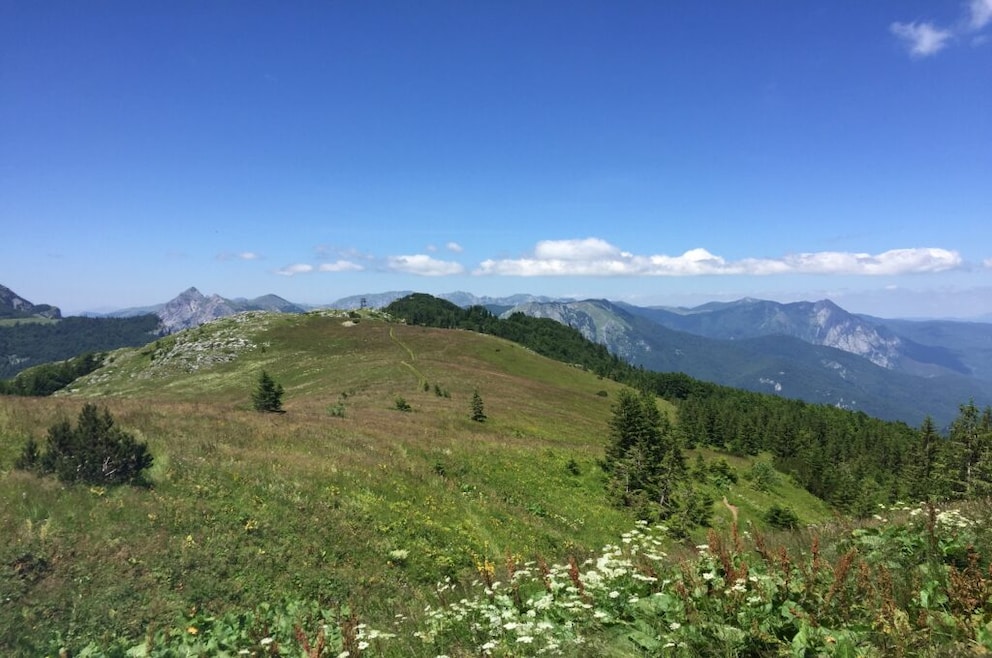
Also interesting: The 16 National Parks of Germany
An Unexpected Lesson
Here, on the border with Montenegro, the horizon seems limitless. The peaks of countless barren karst mountains rise into the bright blue sky, accented only by a few clouds. Our cameras are already clicking wildly to capture these first impressions of the Sutjeska National Park. The landscape, covered in dense coniferous forest at lower elevations, feels like Europe’s last wilderness—if it weren’t for the numerous cars in the hopelessly overcrowded hiking parking lot. The Sutjeska is no longer the insider tip it might have been a few years ago. Nevertheless, the nature is so vast that we begin our adventure without encountering other hikers.
We are actually heading to the summit of Maglić, the highest mountain in the country at 2,386 meters. A tour supposedly suitable for beginners, as I had read on the website. I had previously climbed the highest peaks in Spain, Panama, and Cape Verde and felt well-prepared for this relatively small mountain. What could go wrong? After all, I had been at altitudes over 5,000 meters. So I could certainly imagine that I knew at least a little about mountaineering, right? Well, Maglić quickly taught me otherwise. I knew almost nothing.
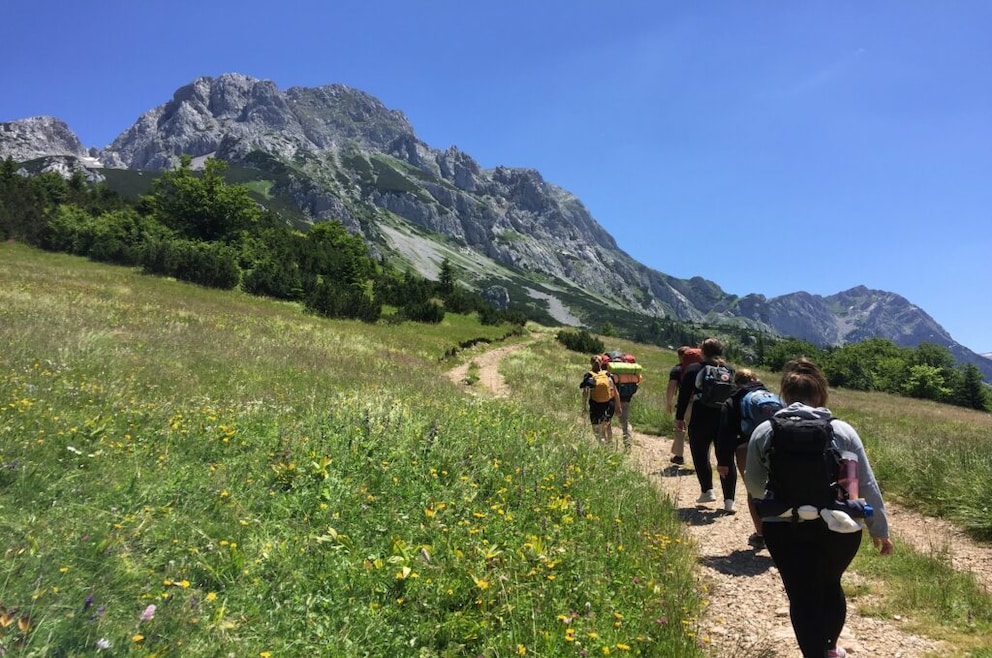
Spectacle Over Safety
Unfortunately, my fellow travelers knew even less. They claimed to have read on the agency’s website that sneakers would be perfectly adequate for the climb. A claim I couldn’t verify afterward. It was noted, albeit in fine print, that sturdy footwear was essential. So, besides the guide, I was the only participant with proper hiking boots. For the first time, I felt a queasy sensation in my stomach, which was heightened by the fact that Marko would be leading us to Maglić alone that day.
I work as a guide in one of my many side jobs, and even in flat terrain, it’s an unwritten rule that a group should always have at least two guides or supervisors. In my opinion, the mountain tour in the Sutjeska National Park should have been canceled under these circumstances. But I’ve often seen in such relatively poorer countries that agencies are primarily concerned with making a profit. And in Bosnia, where the average monthly salary is 300 euros, but a weekend for one person costs 250 euros, it’s somehow understandable.
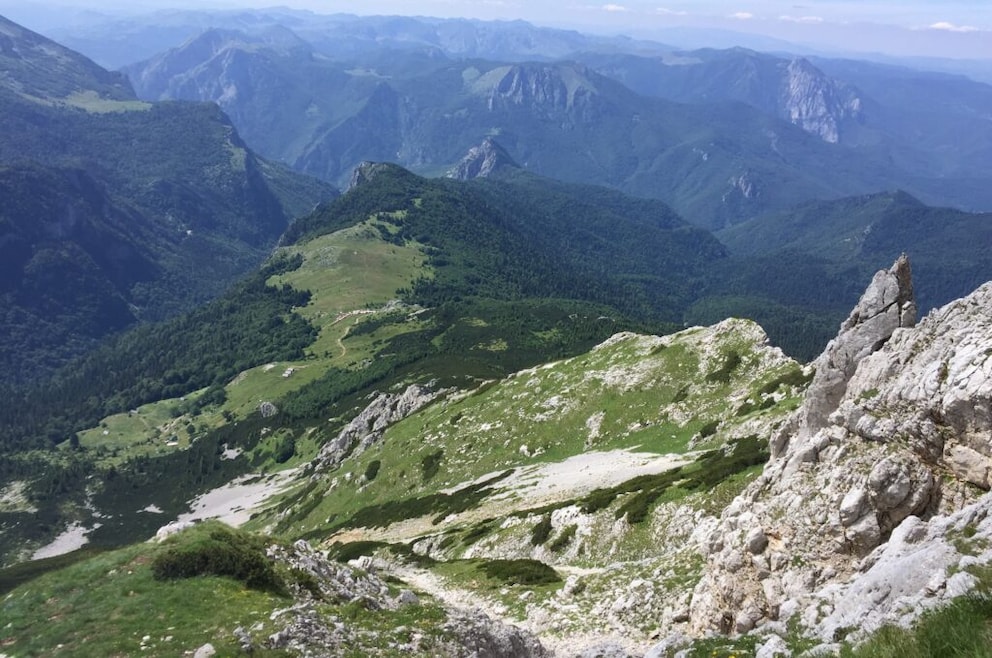
Also interesting: The best tips for tours in the Bavarian Forest National Park
Abandonment After Half an Hour
Nevertheless, Marko’s solo lead backfired after about ten minutes. One of the young Danish women said she felt dizzy and her knee was injured. You might shake your head at such a naive approach, but in the age of Instagram, many seem to have lost their sense of reality for the feasibility of real adventures. It turned out that, except for Marko and me, none of the participants had ever been on any mountain before. Here’s a fact I learned from locals, thankfully after everyone survived the summit attempt relatively unscathed: Maglić is apparently an eight on a difficulty scale of ten.
So, we only went in one direction: steeply uphill. Light forest soon gave way to incredible meadows covered with carpets of flowers, where gentian, buttercup, globeflower, wild thyme, and countless other species bloomed. My heart was already pounding, even though I was the last man and unofficial second guide, supposedly in the most leisurely position in the group. I didn’t set the pace; the people in front of me did. And at this point, guide Marko was already concerned after half an hour. Soon after, two injured Danish women decided to turn back to give the others a chance at the summit. And at this point, a second guide should have been there to accompany them to our campsite. Instead, they set off alone, naturally very insecure, on the way back.
One Wrong Step Would Be Fatal
The higher we climbed, the more incredible the views of the Sutjeska National Park, now far below us in the valley, became. Forests and peaks looked like a model landscape. Such a stark contrast to everyday reality that neither mind nor heart could fully grasp what was happening. Yet, we had to stay alert at all times, as just a footstep behind us were several hundred meters of steep cliffs we had painstakingly climbed. And the most nerve-wracking part of the path was still ahead of us.
What followed was a section I mentally dubbed the Hillary Step, in reference to the most challenging ascent on Mount Everest. We had to climb up partly vertical sections using only a steel cable anchored in the mountain, without carabiners. One wrong step, and this is no exaggeration, would mean certain death. The fact that I didn’t feel fear was probably because I was already mentally composing the angriest complaint emails to the adventure agency that brought us to the Sutjeska National Park. And because I was much more concerned about the female group members, whom I had to constantly secure.
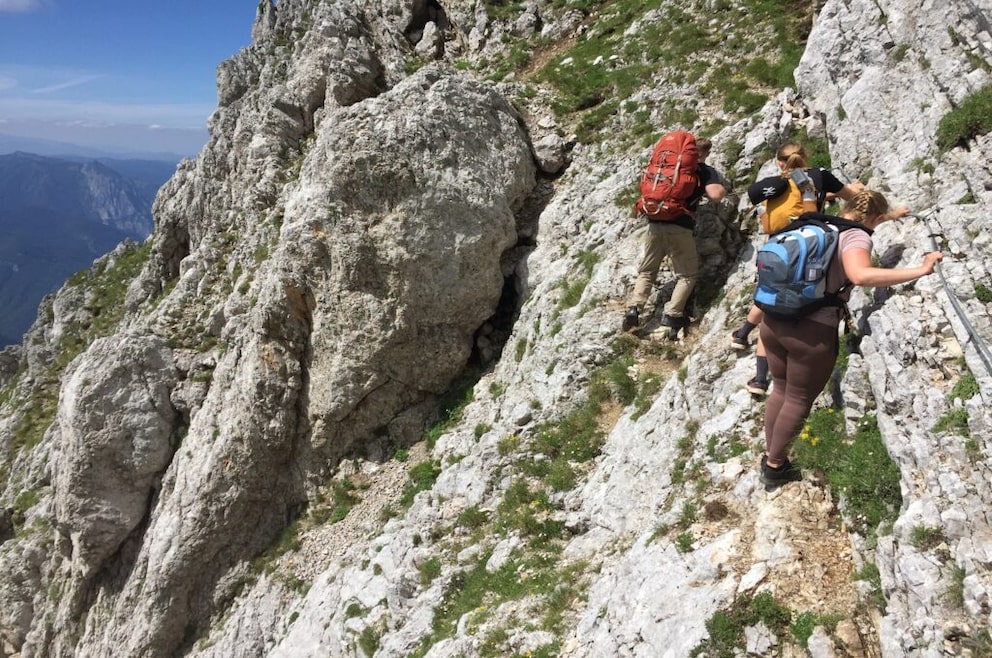
Also interesting: Hiking in the Harz: Alternatives to the Harz National Park
Summit Joy and Descent Horror
But then we actually made it, and we reached the flat, wide summit of Maglić, offering an incredible panoramic view in all directions. The view swept over the countless mountain peaks, mostly already in nearby Montenegro. Only now did my tension dissolve, as everyone had safely reached the proverbial highlight of the Sutjeska National Park. We took a breather, inhaled deeply, and marveled before heading back down after nearly an hour close to the sky. We would spend the night at Trnovačko Lake in Montenegro, which shimmered like a blue diamond in the dramatic landscape from up here.
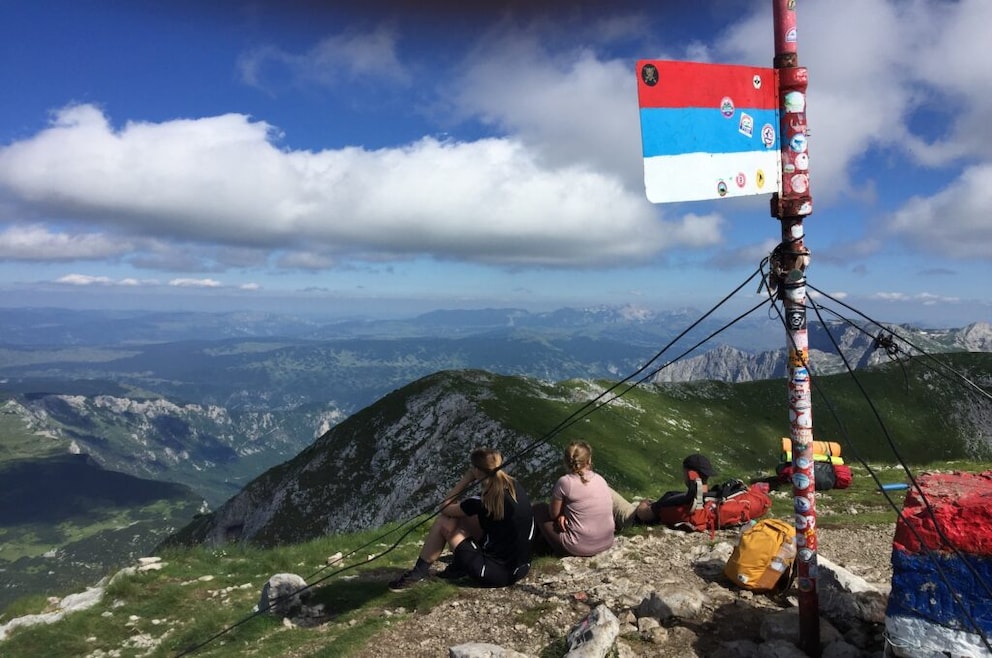
Initially, we crossed a flat high plateau with postcard views, where I had to stop and take pictures every five meters. But the descent quickly turned into a steep gravel path, more of a slope than an actual path. After the exertions of the ascent, it was the next thrill, and my fellow travelers tackled most of the route sliding on their behinds. Here, too, if you fell, it would at least result in significant injuries. The Sutjeska National Park truly showed us its wildest side. An adventure I still look back on in disbelief weeks later as I write these lines.
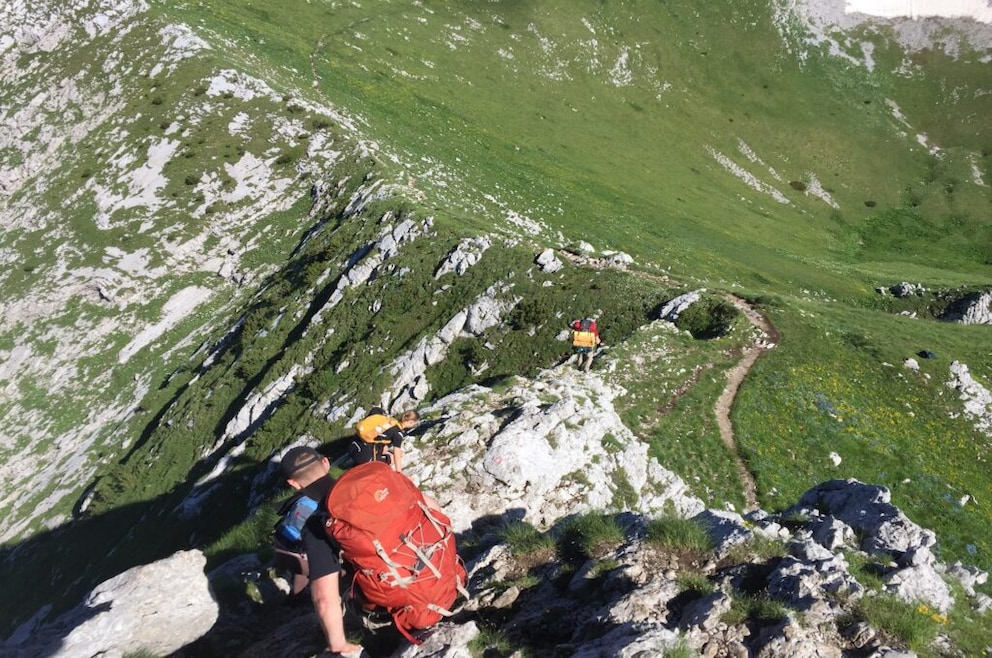
A Primal Wilderness
At night by Trnovačko Lake, sleep was out of the question. Partly due to the excitement still coursing through me, and partly because of the completely clear starry sky, sending millions of lights and even a few shooting stars across the firmament. I warmed myself by the campfire with locals and smoked my first cigarette in ages—I needed a tangible confirmation of being alive at that moment. I lay in my sleeping bag for a long time afterward, a small human in the vast Sutjeska National Park. When the first birds began to sing at 4:30 a.m., I was already awake before them.
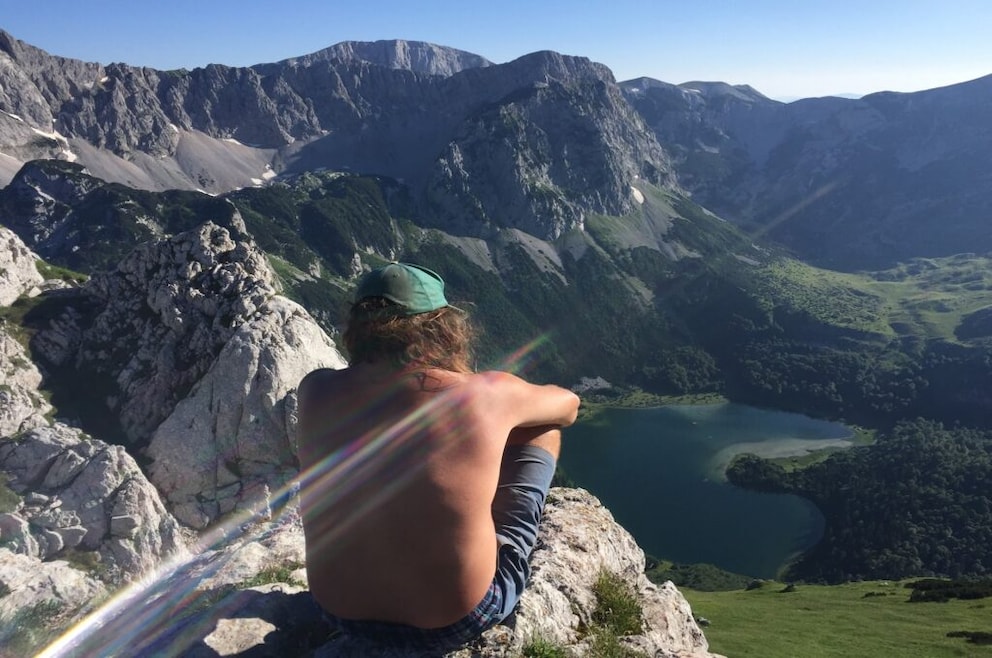
Dense, ghostly fog still lay over the landscape as our small group set off on the hike back to the Prijevor parking lot. It hovered like fluffy cotton near the ground, enveloping the trees and peaks until the rising sun slowly dissolved it. Our goal today was Perućica, according to guide Marko, the oldest primeval forest on European soil at 20,000 years old. The mightiest trees are almost 60 meters high, a primal wilderness where bears still live today. We would embark on a roughly four-hour hike to the Skakavac waterfall, the highest of its kind in Bosnia and Herzegovina at nearly 80 meters.
Also interesting: Two of the most beautiful hikes in the Black Forest
Sutjeska National Park on the Map

‘Why the Highlands are a place of longing for me, as well as a seafood paradise’

Nusa Lembongan is Bali’s Wild Little Sister

Why I Keep Returning to Harz National Park
Bosnia’s Highest Waterfall
The forest is an incredibly calming place right from the start. Except for our footsteps and gentle bird chirping, it absorbs almost every sound in a dense carpet of moss that covers everything here. Unfortunately, the path to the waterfall is also very steep, so you can’t fully enjoy the peace of the forest. Especially since the previous day still weighed heavily on our bones. The narrow path winds past fallen giants, only downhill, deeper into the green heart of the Sutjeska National Park.
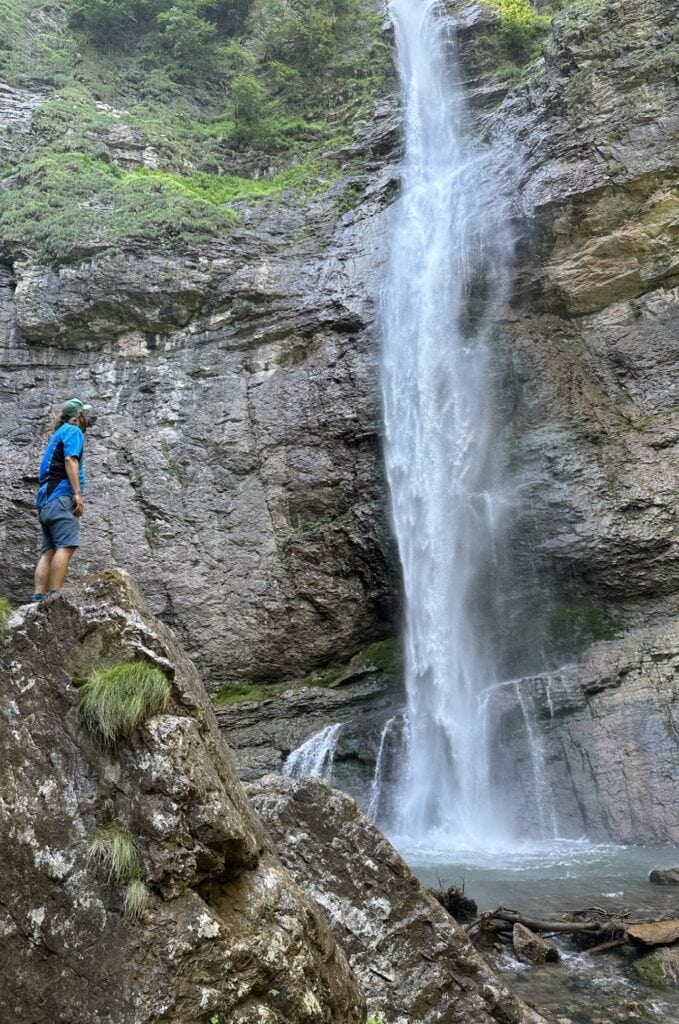
The Skakavac, translated as “Grasshopper,” cascades over a cliff edge into the depths, where we stand at its feet, so to speak. A fine mist soon refreshingly covers the skin, providing relief on this very hot afternoon. But no one can really marvel anymore. Everyone is already thinking about the steep return journey. When it’s finally over, we just collapse into the bus. And catch up on some sleep on the way back to Sarajevo. The Sutjeska National Park revealed some of its secrets to us this weekend. At least I already know that I want to discover all the others someday.


